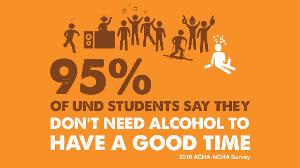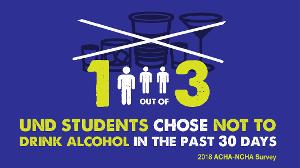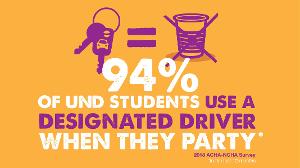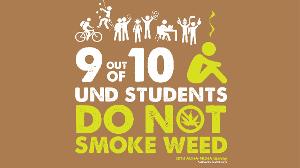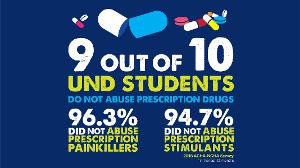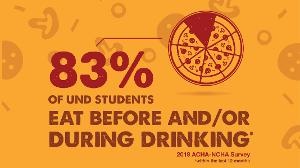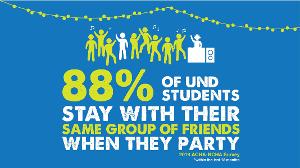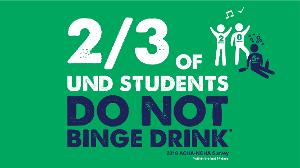Alcohol Education
UND supports student and staff success by promoting a healthy, drug-free lifestyle through education, activities and services.
KNOW Campaign
- KNOW the facts: Does everyone on campus drink? What are UND students really doing?
- KNOW your limit: If you choose to drink, KNOWing how to do it responsibly. How many is too many?
- KNOW how to help: Prevent critical situations from turning into emergencies. KNOW the signs of overdose, how to help, and how the laws protect individuals from criminal punishment when seeking help.
Do you believe it?
These numbers can be difficult for some people to believe, which is precisely why we want people to see them. Perception is not always reality. We tend to assume that “everyone” is getting drunk all the time. When in fact, most people tend to make low-risk choices most of the time. There are a number of reasons why these misperceptions occur.
- Stereotypes and reputations reinforce our misperceptions.
- People who binge drink are usually surrounded by friends who binge drink, thus making it more difficult to see how many people make low-risk choices. (False Consensus)
- Our social media feeds are more likely to feature people who appear to be binge drinking.
- People who make low risk choices tend to hang out in smaller groups of people. Thus, they are less obvious.
- People who make low risk choices tend to draw less attention to themselves when they do go out. Again making them less obvious.
Where do these numbers come from?
Most of the statistics from the KNOW campaign are from the American College Health Association’s National College Health Assessment (ACHA-NCHA). UND has participated in the ACHA-NCHA every other year since 2000. The 2018 Executive Summary is available for you to review. UND has participated in the ACHA-NCHA during all even years since the year 2000.
In addition to the ACHA-NCHA, UND has participated in the CORE Survey and ND ATOD survey each even year since 2006. Having both surveys to compare to one another increases the reliability of our data.
How does UND compare to other campuses?
The American College Health Association’s National College Health Assessment (ACHA-NCHA) is distributed nationally at nearly two hundred schools per year. This allows us to compare our UND results to national averages. We are generally within a percentage point or two with the national averages in most categories. These comparisons, along with our institutional trends over time, help with establishing reliability for our dataset. The national executive summary is available on request.
While drinking can be a good time, not all aspects of it are positive.
Less is More
How do you know when you have had enough to drink?
Some people tend to wait until they feel dizzy or their stomach hurts until they stop drinking. But waiting until this level of impairment can bring with it a lot of the negative effects of drinking. Research suggests this is past the point of diminishing returns and that we are better off consuming less alcohol and keeping our blood alcohol level below .05. How do you do this?
It's as easy as 0-1-2-3
Setting low limits with alcohol will help you stay in control and avoid negative consequences.
0 - When to not drink.
Driving somewhere? Big test coming up? Taking medications? Missed a meal today? Trust yourself to say no when it is in your best interest to avoid drinking.
1 - Drink per hour.
Limit yourself to no more than one standard drink per hour. The body takes just over one hour to process one drink. Drinking faster than this will means dealing with more negative consequences.
2 - Times per week.
Keep drinking down to no more than two times per week. Your body needs two to three days to recover from drinking. Drinking more than twice per week could make it difficult to have a healthy balance with your personal wellness goals.
3 - Drinks per night.
Slow and steady wins the race- no more than three standard drinks per night. Drinking more than this brings out all the negatives...puking, blacking out, hangovers...Yuck!
Protective Behaviors
If you choose to drink, implementing these protective behaviors can help prevent some of those negative effects.
- Eat before and/or during drinking.
- Set a drink limit and stick to it.
- Pace at one standard drink per hour or less.
- Keep track of the number of drinks.
- Alternate with non-alcoholic drinks.
- Stay with the same group of friends.
- Arrange sober transportation.
What is a Standard Drink?
Knowing how to count your drinks is an important part of knowing your limit. The National Institute of Alcohol Abuse and Alcoholism defines a standard drink as:
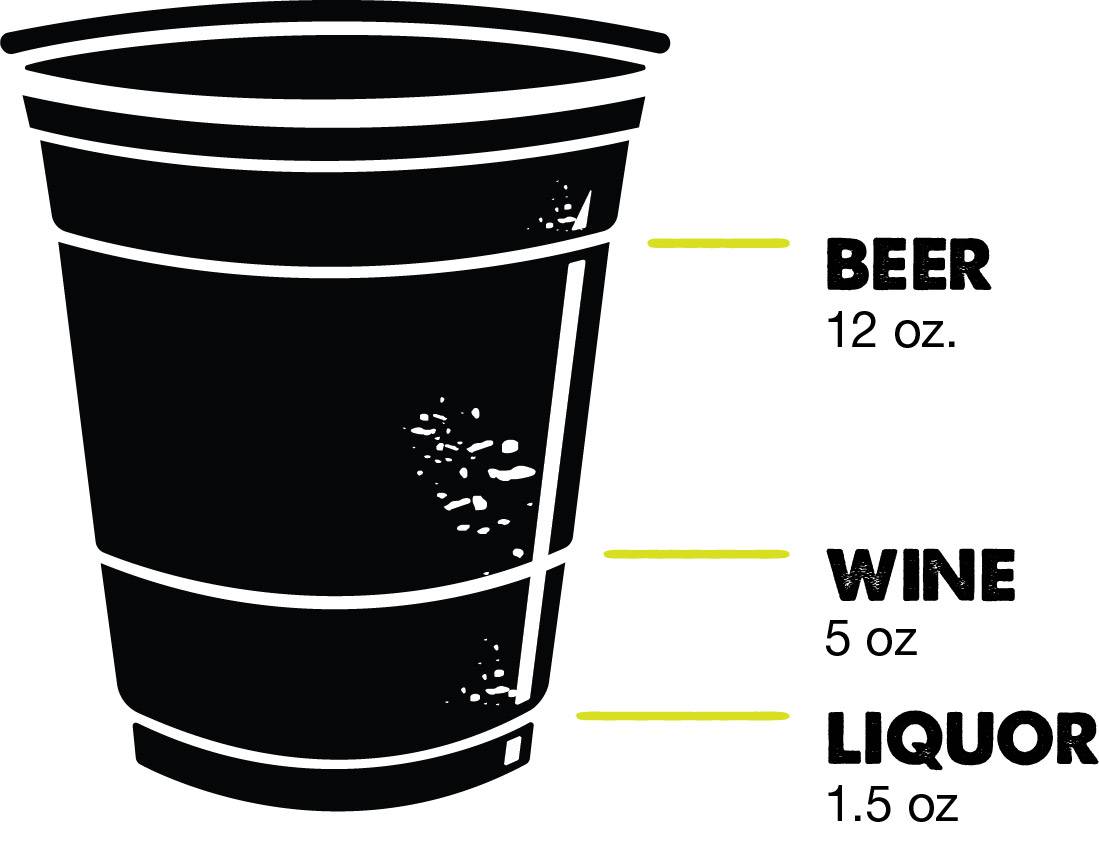
Alcohol Overdose - Know Your C.A.N.S.
Many people think it is okay to just sleep alcohol off. This is not always true. If you or someone else is experiencing alcohol poisoning, getting help may mean saving a life. If you or someone else has ANY of these symptoms, seek help IMMEDIATELY:
C – Cold, Clammy, or Bluish Skin
A – Asleep or Passed Out
N – Non-Responsive
S – Slow or Irregular Breathing
North Dakota Medical Amnesty Act
If you think you or someone else might need help because of drinking too much, call for help!
"An individual under twenty-one years of age is immune from criminal prosecution under [the North Dakota Century Code] if that individual contacted law enforcement or emergency medical services and reported that another individual under twenty-one years of age was in need of medical assistance due to alcohol consumption, provided assistance to the individual in need of medical assistance until assistance arrived and remained on the scene, or was the individual in need of medical assistance and cooperated with medical assistance and law enforcement personnel on the scene. The maximum number of individuals that may be immune for any one occurrence is five individuals."
NOTE: Students involved are not exempt from disciplinary action under the Code of Student Life. All efforts made by students to positively impact the health and safety of others will be taken into consideration and may lessen possible disciplinary outcomes.
Risks and Actions
College Drinking is a Big Deal
While some see college drinking, even to excess, as a harmless rite of passage, it often results in adverse consequences.
- Academic fallout: Missed classes, poor school performance, withdrawal from courses, and dropping out
- Health problems: Alcohol use disorder and other alcohol-related problems, such as sleep issues and depression
- Acute risks: Impaired driving, unsafe sexual behavior, fights, sexual assaults, suicide attempts, unintentional injuries, overdoses, and death
Even students who don't drink may experience secondhand effects, such as disrupted study and sleep, or being the victim of a sexual-related assault.
Source: CollegeAIM, National Institute on Alcohol Abuse and Alcoholism.
Disciplinary Actions
The University responds to reports of the illegal use of substances through its discipline system.
Students in violation of UND's alcohol and drug policy will face disciplinary actions as noted in the Code of Student Life. The Code of Student Life applies to conduct that occurs on University premises and University-sponsored activities, and to off-campus conduct that adversely affects the University Community and/or the pursuit of its objectives. Additionally, University disciplinary proceedings may be instituted against a student charged with conduct that potentially violates both criminal law and the Code of Student Life (that is, if both possible violations result from the same factual situation).
For more information about disciplinary actions and legal sanctions, see the UND Alcohol & Drug Policy.
Alcohol Use/Abuse Education
The University educates students about potentially life-threatening consequences of alcohol use/abuse, and calls on student leaders, administration, faculty, and staff to serve as role models and promote good decision making regarding the risks and consequences surrounding alcohol use/abuse.
UND programs such as the Wellness & Health Promotion Team Program and the University Counseling Center (UCC) Prime for Life and BASICS are intended to increase awareness of issues related to substance abuse and other issues impacting the health, well-being and academic success of students.
The UCC functions to assist students by anticipating and intervening in situations where substance use/abuse may negatively influence student performance in the University and surrounding community. Individual and group counseling, alcohol use assessment, referral for further evaluation and treatment, and educational programming are important components of this service.
Students who are concerned about their own alcohol use and/or about that of others are encouraged to contact UCC. When appropriate, students may be referred to off-campus medical providers.
For more information about campus resources, see the UND Alcohol & Drug Policy.
Learn More
Request a presentation from the Peer Educators at Wellness & Health Promotion for more information on alcohol and other drugs.
